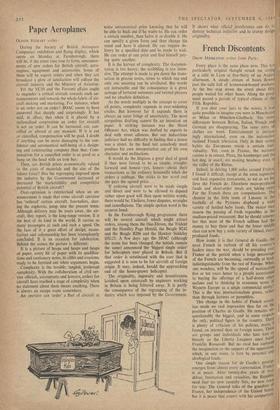Paper Aeroplanes
Ouvra STEwART writes: During the Society of British Aerospace Companies' exhibition and flying display, which opens on Monday at Farnborough, there will be, if the event runs true to form, announce- ments of new orders for British aircraft, aero- engines, equipment and accessories. Some of them will be export orders and when they are broadcast a glow of satisfaction will suffuse the aircraft industry and the Ministry of Aviation.
Yet the VC10 and the Ferranti affairs ought to engender a critical attitude towards such an- nouncements and towards the whole fabric of air- craft making and marketing. For instance, when is an order not an order? BOAC seems to have answered that sharply and surprisingly. It has said, in effect, that when it is placed by a nationalised corporation an order for aircraft is not an order. It can be increased, cut, can- eelled or altered at any moment. If it is cut or cancelled, compensation will be paid. I doubt if anything can be more damaging. to the con- fidence and aeronautical well-being of a design- ing and constructing company than that. Com- pensation for a cancelled order is as good as a bang on the head with an iron bar.
Then, are British prices economically related to the costs of materials and the size of the labour force? Has the regrouping imposed upon the industry by the Government increased or decreased the marketability and competitive potential of British aircraft?
Over-optimism is exteriorised when an an- nouncement is made that some aircraft operator has `ordered' certain aircraft. Journalists, shar- ing the euphoria, jump into the present tense. Although delivery may be years away, the air- craft, they report, is the long-range version. It is the best of its kind in the world. It carries so many passengers at such and such a speed. On the face of it a great effort of design, manu- facture and salesmanship has been triumphantly concluded. It is an occasion for celebration. Behind the scenes the picture is different.
It is a picture of heaps and heaps and heaps of paper, every bit of paper with its qualifica- tions and cautionary notes, its alibis and evasions, ready to be ferreted out when arguments begin. Complexity is the trouble; tangled, irrelevant , complexity. With the collaboration of civil ser- vice officials, accountants and lawyers, orders for aircraft have reached a stage of complexity when no statement about them means anything. There is always an escape route somewhere.
An operator can 'order' a fleet of aircraft at some astronomical price knowing that he will be able to back out if he wants to. He can order a certain number,.then halve it or double it. He can specify a given form and then change his mind and have it altered. He can require de- livery by a specified date and be made to wait. He can order at one price and find himself pay- ing quite another.
It is the harvest of complexity. The documen- tation is too heavy; the scribbling is too inten- sive. The attempt is made to pin down the trans- action in precise terms, terms to which one and only one meaning can be attributed. But words are intractable and the consequence is a great acreage of tortured sentences and twisted phrases and no absolute definition.
As the words multiply in the attempt to cover all points, complexity expands in ever-widening circles. But however far it expands there is always an outer fringe of uncertainty. The most scrupulous drafting cannot fix an intention on paper. A striking instance was the Street Offences Act, which was drafted by experts to deal with street offences. But our industrious judiciary had no difficulty in finding that a house was a street. In the final test somebody must produce his own interpretation out pf his own character and inclinations.
It would do the litigious a great deal of good if they were forced to be as simple, straight- forward and honest—yes, honest—about their transactions as the ordinary housewife when she orders a cabbage. She sticks to her word and she pays the agreed price.
If ordering aircraft were to be made simple and direct and were to be allowed to depend rather upon good will than upon written words, there would be, I believe, fewer disputes, wrangles and cancellations. The simple spoken word is the securest bond.
In the Farnborough flying programme there will be several aircraft which might attract orders, among them the One-Eleven, the Trident and the Handley Page Herald, the Beagle B242 and the Beagle B206 and the Hawker Siddeley HSI25. A few days ago the SBAC (although the name has been changed, the initials remain the same) announced the `biggest single order' for helicopters ever placed in Britain. But if that order is scrutinised with the care that is suggested it is seen to be for aircraft of foreign origin. It may, indeed, herald the approaching end of the home-grown helicopter.
The originality, ingenuity and inventiveness lavished upon rotorcraft by engineers working in Britain is being frittered away. It is partly the consequence of the regrouping of the in- dustry which was imposed by the Government. It shows what official interference can do t destroy technical initiative and to cramp desi originality.






































 Previous page
Previous page